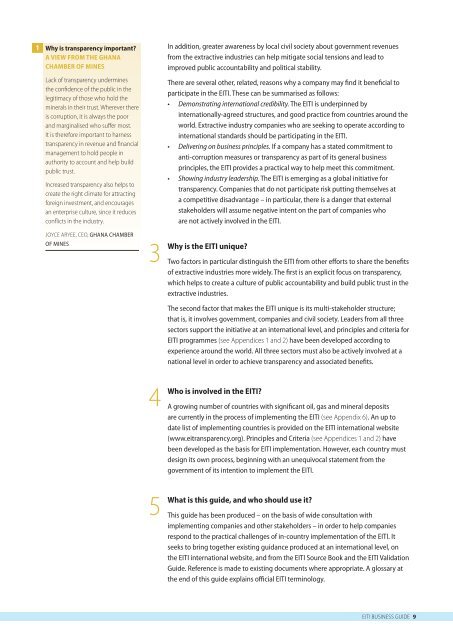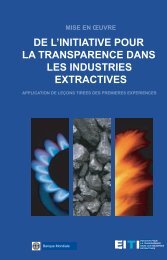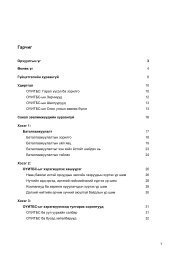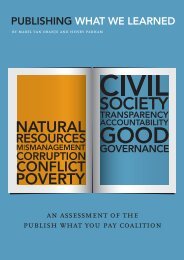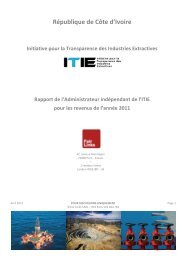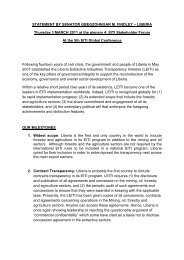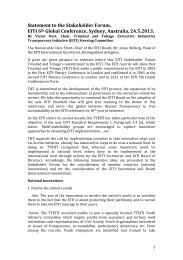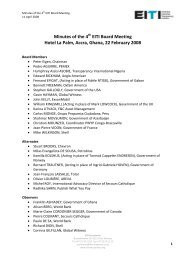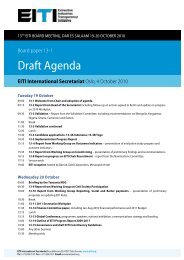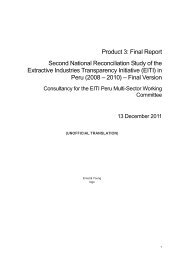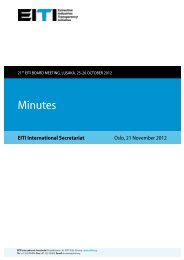EITI Business Guide
EITI Business Guide
EITI Business Guide
You also want an ePaper? Increase the reach of your titles
YUMPU automatically turns print PDFs into web optimized ePapers that Google loves.
1<br />
Why is transparency important?<br />
A VIEW FROM THE GHANA<br />
CHAMBER OF MINES<br />
Lack of transparency undermines<br />
the confidence of the public in the<br />
legitimacy of those who hold the<br />
minerals in their trust. Wherever there<br />
is corruption, it is always the poor<br />
and marginalised who suffer most.<br />
It is therefore important to harness<br />
transparency in revenue and financial<br />
management to hold people in<br />
authority to account and help build<br />
public trust.<br />
Increased transparency also helps to<br />
create the right climate for attracting<br />
foreign investment, and encourages<br />
an enterprise culture, since it reduces<br />
conflicts in the industry.<br />
JOyCE AryEE, CEO, GHana cHaMBEr<br />
oF MInEs<br />
3<br />
4<br />
5<br />
In addition, greater awareness by local civil society about government revenues<br />
from the extractive industries can help mitigate social tensions and lead to<br />
improved public accountability and political stability.<br />
There are several other, related, reasons why a company may find it beneficial to<br />
participate in the <strong>EITI</strong>. These can be summarised as follows:<br />
• Demonstrating international credibility. The <strong>EITI</strong> is underpinned by<br />
internationally-agreed structures, and good practice from countries around the<br />
world. Extractive industry companies who are seeking to operate according to<br />
international standards should be participating in the <strong>EITI</strong>.<br />
• Delivering on business principles. If a company has a stated commitment to<br />
anti-corruption measures or transparency as part of its general business<br />
principles, the <strong>EITI</strong> provides a practical way to help meet this commitment.<br />
• Showing industry leadership. The <strong>EITI</strong> is emerging as a global initiative for<br />
transparency. companies that do not participate risk putting themselves at<br />
a competitive disadvantage – in particular, there is a danger that external<br />
stakeholders will assume negative intent on the part of companies who<br />
are not actively involved in the <strong>EITI</strong>.<br />
Why is the <strong>EITI</strong> unique?<br />
Two factors in particular distinguish the <strong>EITI</strong> from other efforts to share the benefits<br />
of extractive industries more widely. The first is an explicit focus on transparency,<br />
which helps to create a culture of public accountability and build public trust in the<br />
extractive industries.<br />
The second factor that makes the <strong>EITI</strong> unique is its multi-stakeholder structure;<br />
that is, it involves government, companies and civil society. Leaders from all three<br />
sectors support the initiative at an international level, and principles and criteria for<br />
<strong>EITI</strong> programmes (see Appendices 1 and 2) have been developed according to<br />
experience around the world. all three sectors must also be actively involved at a<br />
national level in order to achieve transparency and associated benefits.<br />
Who is involved in the <strong>EITI</strong>?<br />
a growing number of countries with significant oil, gas and mineral deposits<br />
are currently in the process of implementing the <strong>EITI</strong> (see Appendix 6). an up to<br />
date list of implementing countries is provided on the <strong>EITI</strong> international website<br />
(www.eitransparency.org). principles and criteria (see Appendices 1 and 2) have<br />
been developed as the basis for <strong>EITI</strong> implementation. However, each country must<br />
design its own process, beginning with an unequivocal statement from the<br />
government of its intention to implement the <strong>EITI</strong>.<br />
What is this guide, and who should use it?<br />
This guide has been produced – on the basis of wide consultation with<br />
implementing companies and other stakeholders – in order to help companies<br />
respond to the practical challenges of in-country implementation of the <strong>EITI</strong>. It<br />
seeks to bring together existing guidance produced at an international level, on<br />
the <strong>EITI</strong> international website, and from the <strong>EITI</strong> source Book and the <strong>EITI</strong> validation<br />
<strong>Guide</strong>. reference is made to existing documents where appropriate. a glossary at<br />
the end of this guide explains official <strong>EITI</strong> terminology.<br />
<strong>EITI</strong> BUSINESS GUIDE 9


